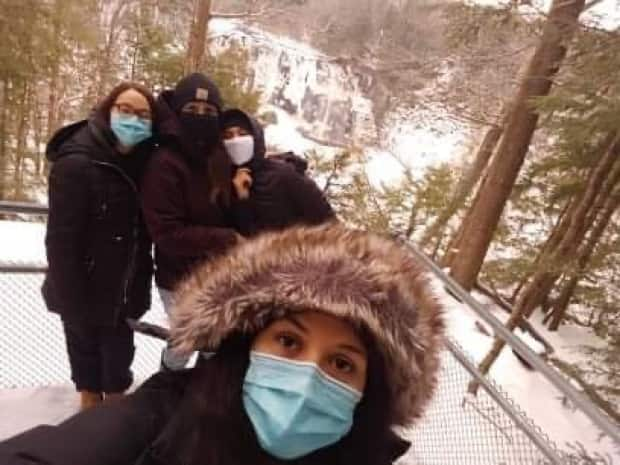How these 3 women are helping advanced Kanien'kéha learners become fluent speakers

The women behind a new grassroots group are taking on an enormous fight for language revitalization.
They're called Ionkwahronkha'onhátie' (which translates to, "we are becoming fluent") and are supporting advanced Kanien'kéha (Mohawk language) speakers from across Canada and the United States.
Taiawentón:ti' Chelsea Sunday said it's important to help others as they continue to lose elders.
"There are going to be people who are going to have to sit there and replace them. We're trying to support those people to get there," said Sunday, who is from Akwesasne, on the Ontario-Quebec-New York state border.
"If we can focus on however many people we can get to those high levels of fluency, then we at least have a fighting chance of saving our language."

She travelled back and forth to Kahnawake, Que., for two years to take Ratiwennahní:rats, a two-year adult immersion program offered by the Kanien'kehá:ka Onkwawén:na Raotitióhkwa Language and Cultural Center.
Upon graduating in 2019, she co-founded the group with her classmate Karonhiióstha Shea Skye as a way to continue their language learning journey.
"We recognize the need to connect with one another, not just now, but especially when the time comes when there's no first language speakers," said Skye, who is from Kahnawake and co-ordinates the group.
Similar immersion programs now exist in Akwesasne, as well as in Six Nations of the Grand River, Ont. Each year, Skye said, new cohorts of students are taking these programs but with few avenues to increase fluency and proficiency post-graduation.

All dialects on 'definitely endangered' list
Despite the many language revitalization efforts in each Kanien'kehá:ka (Mohawk) community, all dialects of the language are on UNESCO's list of "definitely endangered" languages in Canada.
Statistics Canada data from 2016 shows that Kanien'kéha was spoken by roughly 2,350 people in Canada with about half as their mother tongue.
Skye said Ionkwahronkha'onhátie' focuses on developing immersion environments throughout the summer, where a group of advanced learners' full-time job is to continue their studies, talk to elders all day and research aspects of the language that interest them.

But like many activities, the pandemic has brought the group online. They host weekly conversation nights over Zoom that bring together students and elders from many communities.
"The common theme around anything that we've done is just for it to be an immersion setting and for us to use language," said Skye.
"There's a difference between learning about fishing words or swimming words in the classroom and then actually being in that situation and using the words.... You never know what's going to actually come up until you're in that situation and you don't know how to say it."
Throughout the experience, the group hopes to contribute to broader research into second language programs and language revitalization efforts.
Teyútkwʌ Jimerson, who is from Oneida, Wis., is also a graduate of Ratiwennahní:rats. She joined Ionkwahronkha'onhátie' last year to assess and document the program. One of the things she noticed is that the group was helping to fill many gaps in language usage.
"For the first two years of my language learning, I was going somewhere to learn and I was sending my kids to an immersion school to learn. And we were so busy doing that, we didn't bring it home together," said Jimerson.
"This is what Ionkwahronkha'onhátie' did in my home. It took us out of programs. We filled all these gaps that we have in our life, like our friendships. My children know that when I'm with my friends, we speak Kanien'kéha."

